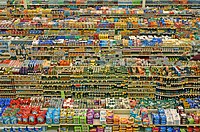
Photo from wikipedia
The rapid development of nanotechnology has been facilitating the transformations of traditional food and agriculture sectors, particularly the invention of smart and active packaging, nanosensors, nanopesticides and nanofertilizers. Numerous novel… Click to show full abstract
The rapid development of nanotechnology has been facilitating the transformations of traditional food and agriculture sectors, particularly the invention of smart and active packaging, nanosensors, nanopesticides and nanofertilizers. Numerous novel nanomaterials have been developed for improving food quality and safety, crop growth, and monitoring environmental conditions. In this review the most recent trends in nanotechnology are discussed and the most challenging tasks and promising opportunities in the food and agriculture sectors from selected recent studies are addressed. The toxicological fundamentals and risk assessment of nanomaterials in these new food and agriculture products are also discussed. We highlighted the potential application of bio-synthesized and bio-inspired nanomaterial for sustainable development. However, fundamental questions with regard to high performance, low toxic nanomaterials need to be addressed to fuel active development and application of nanotechnology. Regulation and legislation are also paramount to regulating the manufacturing, processing, application, as well as disposal of nanomaterials. Efforts are still needed to strengthen public awareness and acceptance of the novel nano-enabled food and agriculture products. We conclude that nanotechnology offers a plethora of opportunities, by providing a novel and sustainable alternative in the food and agriculture sectors.
Journal Title: Journal of food and drug analysis
Year Published: 2019
Link to full text (if available)
Share on Social Media: Sign Up to like & get
recommendations!